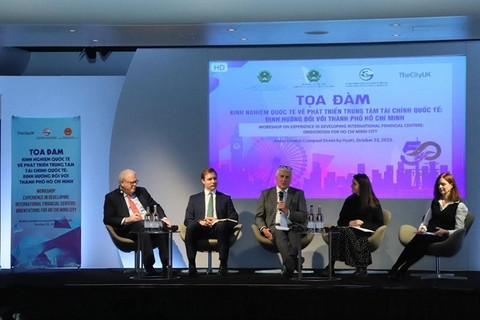
Participants at the seminar. — VNA/VNS Photo
Building HCM City into an international financial centre is one of the key projects of the city, with a strong emphasis on international cooperation with organisations and businesses from the UK.
Speaking at a seminar sharing experiences in developing international financial centres with the UK's financial and investment institutions, banks, and major businesses in London on October 23, Vietnamese Ambassador to the UK, Nguyễn Hoàng Long, said that the construction of an international financial centre in HCM City would be one of the key projects in the Việt Nam-UK strategic partnership.
As one of the world's leading financial centres with extensive experience in supporting the development of international financial centres such as Hong Kong (China), Singapore, and Dubai, London would be the most suitable partner for Việt Nam to collaborate in constructing a new international financial centre in HCM City, Long said.
Việt Nam is targeting to build an international financial centre to leverage international capital flows, enhance its position in the global market, and promote the plan to become a high-income country by 2045, as well as support the sustainable development of Việt Nam and the goal of becoming a zero-emission country by 2050.
Being Việt Nam's largest economic hub, accounting for about 23 per cent of the country's GDP, HCM City has been chosen by the Government to build a financial centre. Vice Chairman of the HCM City People's Committee, Võ Văn Hoan, said the city had completed the draft plan for the construction of the financial centre and submitted it to the Government.
At the seminar, Andrew Oldland, President of TheCityUK, said Việt Nam was a highly competitive market in Southeast Asia, and the establishment of an international financial centre in HCM City would hold great promise.
Oldland noted that, besides developing the capital market, fintech, green finance, and other important areas, there were two crucial issues that determine the success of a financial centre – an independent regulatory framework and clear legal rules would be necessary to reassure investors.
He believed that an attractive international financial centre relied not only on tax incentives but also on economic motivation and business opportunities. The Chairman of TheCityUK also emphasised that the purpose of a financial centre's operations was not only to attract foreign direct investment but also to stimulate the local economy, emphasising that these were two interconnected and supportive factors.
The proposal to build Việt Nam's international financial centre in HCM City is outlined in the 10-year socio-economic development strategy report (2021-30) and was approved during the 13th National Party Congress. The plan has identified four main policy groups and determined a roadmap consisting of three stages. Accordingly, the period from 2021 to 2025 focuses on consolidating HCM City's position as a national financial centre, followed by the period from 2026 to 2030 aiming to develop the city into a regional financial centre. From 2031 onwards, the goal is to develop the city into a global financial centre.
Việt Nam and the UK signed a free trade agreement (UKVFTA) which came into force on May 1, 2021. The UKVFTA is broad, covering market liberalisation for goods, services, and investment. Việt Nam has committed to higher standards of treatment for UK service suppliers and investors under the UKVFTA than those currently applied to other foreign service providers and investors under its WTO commitments.
For financial services, Việt Nam officially committed to larger access in the financial services sector for UK investors, including securities, insurance, banking, and new financial services. Commitments on financial services and investment provide a stable, predictable, and liberal framework for cooperation between the two countries. — VNS